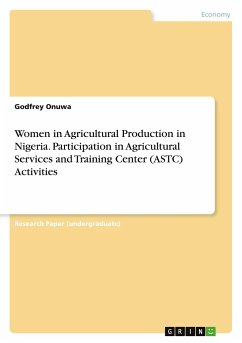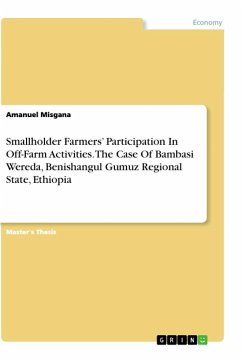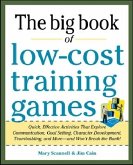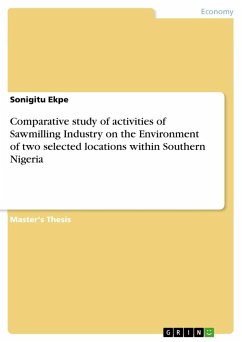Research Paper (undergraduate) from the year 2021 in the subject Economics - Innovation economics, grade: 74.5, , language: English, abstract: The role of women in agricultural production in Nigeria can never be underestimated; women play prime role in traditional farming from manual farm activities, agro-processing and homemaking. This study therefore analyzed the participation in ASTC activities among women farmers in Jos-south Local Government Area of Plateau state, Nigeria. Multi stage sampling techniques was adopted for this study. Primary data collected were analyzed using descriptive statistics, weighted average index analysis and Binary Logit regression. The broad objective of the study was to analyze the participation in agricultural services and training center (ASTC) activities among women in Jos-South Local Government Area, Plateau State, Nigeria. Women constitute more or less half of any country¿s population in most countries. However, women contribute much less than men towards the value of recorded activities both quantitatively in labour force participation and qualitatively in education achievement and skilled manpower. Lawanson (2008) pointed out that, the under-utilization of female in agriculture has obvious implications for economic welfare and growth. Women are regarded as home makers, who oversee and coordinate the affairs and activities at home while the men go out to the farm to work. But at home, however, they engage in the processing of food crops and other produce in addition to their housekeeping duties. In traditional communities, women like their male counterparts, hold farm lands and assist their husbands in their farming activities, as well as actively participate in non-agricultural activities such as craft and dyeing, weaving and spinning, food processing, retail trade, etc. Lawanson (2008) shed more light on the role of Nigerian women in agriculture. As in other parts of Africa, Nigerian women have worked side by side with men in agriculture with some marked division of labour between them. The men performed the tasks of felling trees, gathering and burning of bush and making ridges while women were involved in planting of seeds particularly food crops, harvesting, transportation, processing and selling of farm products. In Nigeria, there are significant regional differences in women participation in agricultural activities; for instance; a study of women in the country revealed that on an overall basis, 40% of the rural women surveyed regarded farming as their major occupation.
Hinweis: Dieser Artikel kann nur an eine deutsche Lieferadresse ausgeliefert werden.
Hinweis: Dieser Artikel kann nur an eine deutsche Lieferadresse ausgeliefert werden.








